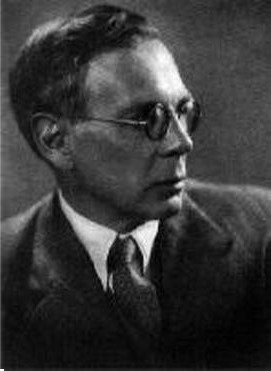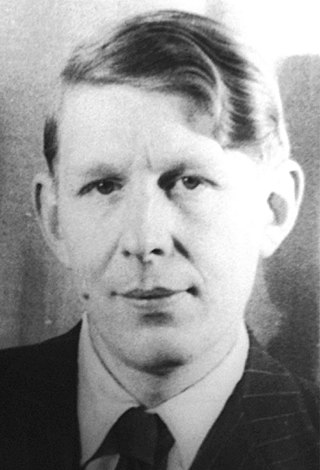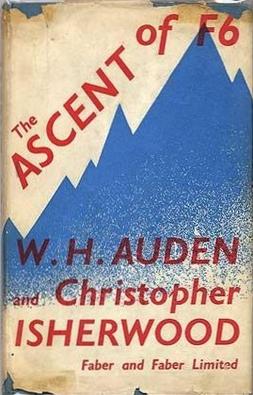
Charles Walter Stansby Williams was an English poet, novelist, playwright, theologian and literary critic. Most of his life was spent in London, where he was born, but in 1939 he moved to Oxford with the university press for which he worked and was buried there following his early death.
A clerihew is a whimsical, four-line biographical poem of a type invented by Edmund Clerihew Bentley. The first line is the name of the poem's subject, usually a famous person, and the remainder puts the subject in an absurd light or reveals something unknown or spurious about the subject. The rhyme scheme is AABB, and the rhymes are often forced. The line length and metre are irregular. Bentley invented the clerihew in school and then popularized it in books. One of his best known is this (1905):

Wystan Hugh Auden was a British-American poet. Auden's poetry is noted for its stylistic and technical achievement, its engagement with politics, morals, love, and religion, and its variety in tone, form, and content. Some of his best known poems are about love, such as "Funeral Blues"; on political and social themes, such as "September 1, 1939" and "The Shield of Achilles"; on cultural and psychological themes, such as The Age of Anxiety; and on religious themes, such as "For the Time Being" and "Horae Canonicae".

Christopher William Bradshaw Isherwood was an Anglo-American novelist, playwright, screenwriter, autobiographer, and diarist. His best-known works include Goodbye to Berlin (1939), a semi-autobiographical novel which inspired the musical Cabaret (1966); A Single Man (1964), adapted as a film by Tom Ford in 2009; and Christopher and His Kind (1976), a memoir which "carried him into the heart of the Gay Liberation movement".

The Rake's Progress is an English-language opera from 1951 in three acts and an epilogue by Igor Stravinsky. The libretto, written by W. H. Auden and Chester Kallman, is based loosely on the eight paintings and engravings A Rake's Progress (1733–1735) of William Hogarth, which Stravinsky had seen on 2 May 1947, in a Chicago exhibition.
Michael Roberts, originally named William Edward Roberts, was an English poet, writer, scientist, mathematician, critic and broadcaster, a polymath who made his living as a teacher.

Frederick Louis MacNeice was an Irish poet and playwright, and a member of the so-called Auden Group, which also included W. H. Auden, Stephen Spender and Cecil Day-Lewis. MacNeice's body of work was widely appreciated by the public during his lifetime, due in part to his relaxed but socially and emotionally aware style. Never as overtly or simplistically political as some of his contemporaries, he expressed a humane opposition to totalitarianism as well as an acute awareness of his roots.
Edward Mendelson is a professor of English and Comparative Literature and the Lionel Trilling Professor in the Humanities at Columbia University. He is the literary executor of the Estate of W. H. Auden and the author or editor of several books about Auden's work, including Early Auden (1981) and Later Auden (1999). He is also the author of The Things That Matter: What Seven Classic Novels Have to Say About the Stages of Life (2006), about nineteenth- and twentieth-century novels, and Moral Agents: Eight Twentieth-Century American Writers (2015).
"Funeral Blues", or "Stop all the clocks", is a poem by W. H. Auden which first appeared in the 1936 play The Ascent of F6. Auden substantially rewrote the poem several years later as a cabaret song for the singer Hedli Anderson. Both versions were set to music by the composer Benjamin Britten. The second version was first published in 1938 and was titled "Funeral Blues" in Auden's 1940 Another Time. The poem experienced renewed popularity after being read in the film Four Weddings and a Funeral (1994), which also led to increased attention on Auden's other work. It has since been cited as one of the most popular modern poems in the United Kingdom.

Poems is the title of three separate collections of the early poetry of W. H. Auden. Auden refused to title his early work because he wanted the reader to confront the poetry itself. Consequently, his first book was called simply Poems when it was printed by his friend and fellow poet Stephen Spender in 1928; he used the same title for the very different book published by Faber and Faber in 1930, and by Random House in 1934, which also included The Orators and The Dance of Death.

The Dog Beneath the Skin, or Where is Francis? A Play in Three Acts, by W. H. Auden and Christopher Isherwood, was the first Auden-Isherwood collaboration and an important contribution to English poetic drama in the 1930s. It was published in 1935 and first performed by the Group Theatre in 1936.

The Ascent of F6: A Tragedy in Two Acts, by W. H. Auden and Christopher Isherwood, was the second and most successful play in the Auden-Isherwood collaboration, first published in 1936. It was a major contribution to English poetic drama in the 1930s. It has been seen as a parable about will, leadership and the nature of power: matters of increasing concern in Europe as that decade progressed.
"The Sea and the Mirror: A Commentary on Shakespeare's The Tempest" is a long poem by W.H. Auden, written 1942–44, and first published in 1944. Auden regarded the work as “my Ars Poetica, in the same way I believe The Tempest to have been Shakespeare’s.”

Epistle to a Godson and other poems is a book of poems by W. H. Auden, published in 1972.

Sir Stephen Harold Spender was an English poet, novelist and essayist whose work concentrated on themes of social injustice and the class struggle. He was appointed U.S. Poet Laureate Consultant in Poetry to the Library of Congress in 1965.
This is a bibliography of books, plays, films, and libretti written, edited, or translated by the Anglo-American poet W. H. Auden (1907–1973). See the main entry for a list of biographical and critical studies and external links.
Vägmärken, published in 1963, is the only book by former UN secretary general, Dag Hammarskjöld. The journal was discovered after his death, with a covering letter to his literary executor, "a sort of White Book concerning my negotiations with myself - and with God." After the original Swedish version was published in 1963, the English translation came out in 1964, The translation was done by noted Swedish scholar Leif Sjöberg, and was refined by the poet W. H. Auden, who also wrote a foreword. This brought the book immediate literary notice, and even a front-page rave in The New York Times Book Review. It is highly regarded as a classic of contemporary spiritual literature.
Joan Vincent Murray was a Canadian American poet.
Frank McEachran, sometimes known as Kek, was a British schoolmaster and writer. He taught at English public schools and the University of Leipzig and wrote on philosophy, but his most commercially successful books were his anthologies Spells for Poets and More Spells which appeared in the 1950s.
Bucolics is a sequence of poems by W. H. Auden written in 1952 and 1953. The seven poems in the sequence are: "Winds", "Woods, "Mountains", "Lakes", "Islands", "Plains", and "Streams".









